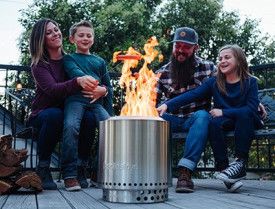
Published in January 2019, the government’s Clean Air Strategy sets out plans for dealing with all sources of air pollution, in order to make UK air healthier to breathe, protect nature and boost the economy. Whether your business supplies wood fuel to consumers, produces woodburning appliances or makes direct use of wood fuel, it’s important to understand what the Clean Air Strategy is and how you can get behind it.
Over the last few decades, tackling the biggest individual sources of pollution has been the government's priority. The worst impacts of air pollution have been addressed through regulations, industry investment in cleaner processes and a move towards renewable energy. Even so, exposure to airborne pollution is still one of the UK’s biggest public health challenges, shortening lifespans and damaging many people’s quality of life, as well as harming our natural environment.
As the more major sources of emissions have decreased, the impact of smaller sources – such as heating homes and even cleaning with certain solvents – has become more evident. In response to this shift and in line with recommendations from the World Health Organisation, the government has adopted ambitious, legally binding targets to reduce emissions and tackle public exposure to particulate matter pollution. But the Clean Air Strategy isn’t all about what the government needs to do; it sets out how businesses and the general public can take action too.
How will the clean air strategy affect my business?
Many people will be unaware of how emissions produced by wood burning appliances in their homes and businesses increase their exposure to pollutants and contribute significantly to the country’s overall emissions. It’s been found that burning wood and coal in open fires and stoves makes up 38% of the UK’s primary emissions of fine particulate matter (PM) - a high percentage compared to what is produced by industrial combustion (16%) and road transport (12%). Woodburning stoves, pizza ovens and outdoor appliances such as firepits have seen a recent rise in popularity and domestic burning is now the single biggest source of PM emissions in the UK.
There has been some concern that the Clean Air Strategy looks to restrict the use of woodburning appliances, but it actually seeks to encourage “cleaner burning” by outlining new legislation that will be introduced to ban the sale of the most polluting fuels. By ensuring that only clean, dry wood with a moisture content of less than 20% is sold and burned, PM emissions can be drastically reduced.
Which wood will meet the standards in the Clean Air Strategy?
Identifying wood that will meet these standards is simple – just look for the ‘Ready to Burn’ logo. Led by Woodsure, the UK’s only wood fuel quality assurance scheme, the ‘Ready to Burn’ initiative is backed by the government to enable people to easily recognise which wood is ready for immediate use. Whilst wet wood produces nasty emissions, burns inefficiently and can damage appliances, ‘Ready to Burn’ kiln dried logs can reduce emissions by 50% and, because they burn more efficiently, they’re more cost effective. You can read more about the ins and outs of the ‘Ready to Burn’ scheme here.
All our logs and kindling are certified Woodsure ‘Ready to Burn’ and we supply direct to businesses. Whether you produce woodburning stoves and want to be able to recommend a cleaner fuel to your customers, you need the best fuel for your restaurant’s pizza oven or you’re looking to become a stockist, our distribution centres across the UK can ensure your needs are met quickly and efficiently. Our FSC sourced and Woodsure certification offers you and your customers complete reassurance in the quality of our wood fuel, as well as confidence in its compliance with upcoming legislative changes. For more information on our trade and wholesale offering, get in touch.






